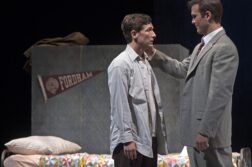
On my first book tour in 2006, I found myself in Provincetown. The place itself wasn’t new to me; I’d been going every summer for many years. But it was my first time at Bear Week.
I was just there for a quick overnight—enough time to give a reading and head back to New York the next morning. But I knew what people had to do to promote their events: I had to stand on the street, handing out palm cards.
The best place to do this was outside the Boatslip at 7 p.m., when hordes poured out of tea dance, making plans for the evening. So I stood on the side of Commercial Street next to more experienced hawkers who were louder, cuter, more aggressive, and dressed to attract attention— wearing either elaborate costumes or skimpy outfits, whichever might turn the most heads.
I was not particularly comfortable doing self-promotion, so I stayed quiet, holding a small stack of black-and-white paper flyers I’d photocopied at my office. There were few takers. Drag queens pushing bawdy cabarets and body-glittered porn stars advertising bingo games were stealing the show.
One burly bear offered me some unsolicited advice: “You’ll have better luck if you take off your shirt.”
If there was one thing I liked less than handing out flyers, it was taking off my shirt in public.
“I don’t really do that,” I replied.
“This is Bear Week,” he said. “You’ve got to get over it.”
It was only fitting, I suppose, that I was wrestling with my own longstanding body issues while promoting Hard, a book whose protagonist battles similar demons about being overweight before finding a surprising glimmer of acceptance in the nascent bear community of the 1990s.
Reluctantly, I did it. I took off my shirt in public. I hadn’t done such a thing for years—not since I had, in rare moment of exuberance in my twenties, taken off my shirt in a dark, seedy sex club, only to hear someone ask in a stage whisper: “Why is it always the wrong guys who take their shirts off?”
On Commercial Street, I met no such judgment. I got one whistle, a few smiles, a nod here and there. And more importantly, it worked: Men started taking my flyers. I had a full house for my reading.
*
I’d spent years on the margins of the bear community. I was bearded and hairy, with a belly, and I liked guys with similar physiques; I just wasn’t much of a joiner. If someone asked if I was a bear, I might say yes—it was a useful shorthand to describe my appearance. But I wasn’t a Bear with a capital B, joining bear groups, going to bear events, getting bear tattoos. Why build my identity around my facial hair, or my waistline?
I went back to Provincetown the next summer, and the next, but not during Bear Week. Then, in 2009, a younger friend of mine said he wanted to check out the event. We went together. And I changed my mind about the whole thing.
It turned out, on the street that day in 2006, not to be a fluke. I had always gone to tea dance on my Provincetown vacations, but kept my shirt on, no matter how much I sweated. During Bear Week, any time I felt embarrassed or ashamed of my body, I kept hearing that advice I’d been given on my book tour. So I took off my shirt on the dance floor. On the street. In the bars.
Nobody pointed and laughed or made rude remarks for me to overhear. Some guys actually made approving comments, gave me a wink, ran their hands over my chest as they walked by.
I felt sexy, desirable, confident in my own skin in a way I rarely had as an adult.
I wondered if I’d been unduly concerned about people’s reactions all this time. Maybe it wasn’t just about bear space; the whole gay community might be more accepting than I’d imagined, at least in Provincetown, a generally relaxed and welcoming place. So I found a cheap place to stay and extended my stay for an extra night. Almost all of the bears packed up and left when Bear Week officially ended. By Sunday afternoon’s tea dance, the crowds in town had completely changed: not so many beards, nary a bear-paw tattoo, hardly anyone woofing at passersby. Unfazed, I strode into the Boatslip, walked to the dance floor with my newfound confidence, and took off my shirt. Not a minute had gone by when I heard a man behind me say, “Yeccch, put your shirt back on.” I looked around. There was nobody to back me up, or mirror my feelings. I put the shirt back on. The magic I’d felt was, in fact, about Bear Week in particular.
More than a decade later, I’ve tried to keep that feeling inside myself when I’m not in a bear-specific space. I still go to Provincetown other times of the year, and sometimes—now that I’m over 50 and worry less about others’ opinions—I muster the moxie to take off my shirt no matter who says what. But I haven’t missed a Bear Week since then. I go dancing every day, shirtless. One week every year. It recharges me when my self-confidence is running low.
So it was no surprise that when I wrote An Older Man, the sequel to Hard set 15 years later, my protagonist found himself at Bear Week. Like me, he was still wary of labels, but he’d discovered the place where he felt like he belonged.
The real-life scene where the guy outside tea dance told me to “get over it” became a scene in An Older Man. I finally did get over it. And so did my protagonist.
Wayne Hoffman is the author of the true crime familiy memoir The End of Her: Racing Against Alzheimer’s to Solve a Murder, as well as three novels: Hard, An Older Man, and Sweet Like Sugar, which won the American Library Association’s Stonewall Book Award.






Discussion1 Comment
Your story poignantly captures the magic of Bear week. While Provincetown has been a summer retreat of mine for many years, Bear week is fairly new. The unconditional love and kindness of “Bears” is profoundly mesmerizing.